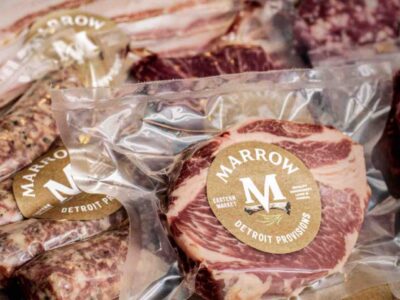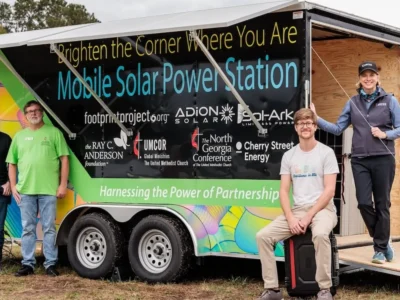Brianna Bond has always loved food.
“I was a voracious eater as a child but not interested in cooking – I was not the kid at my mother’s knee wanting to stir the tomato sauce,” Bond said. After wandering with purpose from a path in law to food writing to the culinary arts, Bond has worked in restaurants, as a personal chef, and in catering. Today, she works as a consulting chef on a farm in Wisconsin where she prepares dishes from farm-fresh ingredients, hosts farm dinners, and teaches cooking classes while she pursues a graduate degree in writing on the side.
But it’s more than food that has drawn her to the kitchen and kept her at the cutting board. The kitchen and its accompanying table are places of communion.
In her mid-20s, right before she was set to begin her journey into law school, Bond’s mom discovered a food writing program in Florence, Italy for one year. Bond jumped at the opportunity, which began her long journey into the culinary world. In Italy, Bond discovered an entirely different attitude around food consumption.
“There’s still this reverence for and intentionality in this act of eating,” Bond said. “Every time you’re interacting with food in a market it feels infused with importance. I didn’t realize at the time but I was so insanely inspired by that – it was a very stark contrast to the culture I was swimming in.”
When we’re talking about food, “We’re talking about hunger,” said Bond. “Hunger is a metaphor on so many levels. It is part of the universal human experience. How do we find satiety in its varying forms, especially with another person? When you eat together it fuses you to each other.”
Good eating—the slow kind, the kind of meal that takes a while to cook and to consume, the kind that gives space for friendship to simmer and thoughts to be rendered—is an opening for the Spirit to move and manifest as joy among us.
“It feels like an emotional uplifting – good communion as it were,” said Bond. “I’ve done plenty of cooking that’s drudgerous, but the cooking that brings me back is the kind where I’m communing with the people I’m cooking for.”
Sometimes cooking is drudgery. But it doesn’t have to be. The attitude and approach we take towards each meal and the weight we place upon cooking changes our experience of food, for better or for worse. It can fulfill our basest needs for survival, or it can be an illuminating, inspiring experience, and it can go either way or many ways in between for every single meal. There’s a new opportunity morning, noon, and night.
“I had a birthday party this summer and hosted a small intimate group of friends,” Bond said. “I made what I wanted to make, and we sat around for six hours, drinking good wine and tea,” enjoying good food and good company. “People walked away feeling like, ‘I haven’t done that in a long time; that was so good.”
At its core, cooking is an incarnate experience, an opportunity to participate in the act of creation. And why else create except to connect, with one another, with yourself, with the Creator? “You are actually making something out of raw materials, which is something a lot of us don’t get to do in our modern economic structure,” Bond said. “It’s a unique creative experience because it’s so physical, so material. I walk away differently than when I came. Gathering reminds me that I am not alone.”
Teaching the Art of Slow, Sustainable Eating
Half a century ago, the idea that anyone would need to learn how to slow down, prepare a meal, and enjoy it with their friends and family would have seemed crazy. It’s just what we used to do, all of the time, as part of our regular routines. Today, we grab a granola bar on our way out the door, eat our lunch on a bench in the park (or over our desks in our office), and pop a frozen pizza in the oven for the grab-and-growl chaos of another frantic night spent zipping from one activity to the next.
The spirit of food has shifted in the last 50 to 70 years in America. Unless you come from a different cultural family setting, food is about sustenance. It’s fuel to get you back into production mode. It’s consumed thoughtlessly, picked off a grocery shelf with very little knowledge about how it got there, who picked it, who prepared it, or what’s even in it.
If you eat this way too long, you lose sight of how deeply dependent and connected we are to the soil, to the plants, and to the animals that also inhabit this planet.
Bond’s work on the Milwaukee farm strives to reawaken those of us who are hungry to renew that connection. The farm Bond serves exists as a passion project of conservation. “The core mission of the farm and market is education based,” Bond said. On the farm, she offers cooking classes, which provide a space for people to dabble in sustainable living in a way that isn’t as intimidating.
“If you’re a layperson trying to figure out what to do, it’s daunting,” Bond said. “You start reading about what is going on, and it’s easier to bury your head in the sand because it’s too overwhelming. But I truly believe that everyone taking very small steps consistently will start to move the needle. We can all be doing things, and a lot of it has to do with being more curious and asking more questions about what we’re consuming.”
The classes Bond offers on the farm provide the perfect setting to demonstrate the simple and essential connections we have to the earth, and how our choices in the kitchen can take those small steps forward toward a healthier planet. Bond takes her students for a walk through the garden, where she can talk about the vegetables and fruits and make living this way seem less overwhelming.
Bond’s cooking classes aren’t about fancy tricks or sophisticated techniques. Instead, she aims to help others learn the basic building blocks that can transform their experience in the kitchen and give them more confidence to prepare a variety of mix-and-match meals. Bond teaches things like how to roast a vegetable, how to make a pan sauce, and how to cook a chicken breast.
“It’s super simple; that’s how we used to cook. We knew it intuitively,” said Bond. “But part of the issue is that creativity thrives within constraint.” Today we have access to every ingredient imaginable, all year round. It’s too many options. “Strawberries all year round are great but it comes at a tremendous cost.” Look instead to what can be accessed locally, from farmer’s markets, local butchers, and community gardens.
“My favorite way to cook is out of my own refrigerator, working with what we have,” said Bond. Using what you have is just one simple way to reduce food waste toward a more sustainable life. The more consumers make smart, sustainable choices from businesses and farms that are taking steps toward a more sustainable life, the more businesses and farmers will respond. It’s a ripple effect, and it all begins around our own kitchen tables.
“I love my job,” Bond said, “I think I will always cook because it was one of the things I was born to do.”





 Copyright
2024
Root and Vine
Copyright
2024
Root and Vine